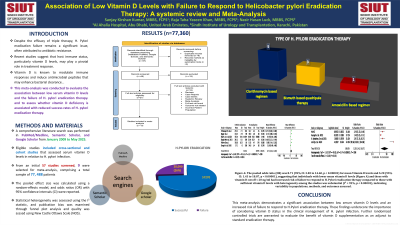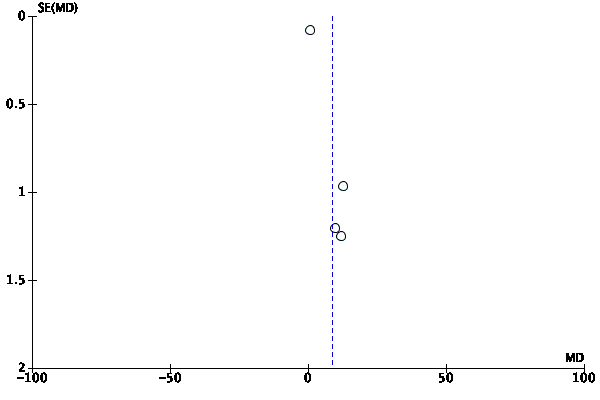Tuesday Poster Session
Category: Stomach and Spleen
P6307 - Association of Low Vitamin D Levels With Failure to Respond to Helicobacter pylori Eradication Therapy: A Meta-Analysis
Tuesday, October 28, 2025
10:30 AM - 4:00 PM PDT
Location: Exhibit Hall

Has Audio
- SK
Sanjay Kirshan Kumar, FCPS
Ahalia Hospital
Abu Dhabi, Abu Dhabi, United Arab Emirates
Presenting Author(s)
Raja Taha Yaseen TY. Khan, MBBS, FCPS, ESEGH1, Nasir Hassan Luck, FCPS1, Ali Hyder, FCPS2, Salman Ahsam, FCPS, MRCP, ESEGH3, Sanjay Kirshan Kumar, FCPS4, Muhammad Usama Kiyani, MBBS1, Hina Ismail, FCPS5, Abbas Ali Tasneem, MBBS, FCPS1
1Sindh Institute of Urology and Transplantation, Karachi, Sindh, Pakistan; 2Chandka Medical College, SMBBU, Larkana, Sindh, Pakistan; 3Social Security Hospital, Faislabad, Faisalabad, Punjab, Pakistan; 4Ahalia Hospital, Abu Dhabi, Abu Dhabi, United Arab Emirates; 5University Hospital Limerick, Limerick, Limerick, Ireland
Introduction: Helicobacter pylori (H. pylori) infection is a widespread chronic bacterial infection associated with peptic ulcer disease, gastric adenocarcinoma, and mucosa-associated lymphoid tissue lymphoma. Despite the efficacy of triple therapy, eradication failure remains a significant issue, often attributed to antibiotic resistance. Recent studies suggest that host immune status, particularly vitamin D levels, may play a pivotal role in treatment response. Vitamin D is known to modulate immune responses and induce antimicrobial peptides that may enhance bacterial clearance. This meta-analysis was conducted to evaluate the association between low serum vitamin D levels and the failure of H. pylori eradication therapy.
Methods: A comprehensive literature search was conducted in PubMed, Semantic Scholar, and Google Scholar from January 2009 to May 2025. Observational studies, including cross-sectional and cohort designs, evaluating serum vitamin D levels in relation to H. pylori eradication outcomes were included. Of 57 initially identified studies, 4 met inclusion criteria with a total pooled sample of 75,188 patients (eradication group: 56,217; no eradication: 19,917). A random-effects model was used to estimate the pooled mean difference with 95% confidence intervals (CI). Heterogeneity was assessed using the I² statistic, and publication bias was evaluated using a funnel plot.
Results: The pooled analysis revealed that patients with successful H. pylori eradication had significantly higher mean serum vitamin D levels compared to those in whom eradication failed. The overall mean difference was 8.81 ng/mL (95% CI: 1.11 to 16.52, p = 0.02), indicating a statistically significant association. Substantial heterogeneity was noted (Chi² = 292.31, p < 0.00001, I² = 99%, Tau² = 60.79). The funnel plot was symmetrical, indicating no significant publication bias.
Discussion: Vitamin D deficiency is significantly associated with reduced success of H. pylori eradication therapy. These findings underscore the importance of considering vitamin D status in the clinical management of H. pylori infection. Further randomized controlled trials are warranted to evaluate the benefit of vitamin D supplementation as an adjunct to standard eradication therapy.


Disclosures:
Raja Taha Yaseen TY. Khan, MBBS, FCPS, ESEGH1, Nasir Hassan Luck, FCPS1, Ali Hyder, FCPS2, Salman Ahsam, FCPS, MRCP, ESEGH3, Sanjay Kirshan Kumar, FCPS4, Muhammad Usama Kiyani, MBBS1, Hina Ismail, FCPS5, Abbas Ali Tasneem, MBBS, FCPS1. P6307 - Association of Low Vitamin D Levels With Failure to Respond to <i>Helicobacter pylori</i> Eradication Therapy: A Meta-Analysis, ACG 2025 Annual Scientific Meeting Abstracts. Phoenix, AZ: American College of Gastroenterology.
1Sindh Institute of Urology and Transplantation, Karachi, Sindh, Pakistan; 2Chandka Medical College, SMBBU, Larkana, Sindh, Pakistan; 3Social Security Hospital, Faislabad, Faisalabad, Punjab, Pakistan; 4Ahalia Hospital, Abu Dhabi, Abu Dhabi, United Arab Emirates; 5University Hospital Limerick, Limerick, Limerick, Ireland
Introduction: Helicobacter pylori (H. pylori) infection is a widespread chronic bacterial infection associated with peptic ulcer disease, gastric adenocarcinoma, and mucosa-associated lymphoid tissue lymphoma. Despite the efficacy of triple therapy, eradication failure remains a significant issue, often attributed to antibiotic resistance. Recent studies suggest that host immune status, particularly vitamin D levels, may play a pivotal role in treatment response. Vitamin D is known to modulate immune responses and induce antimicrobial peptides that may enhance bacterial clearance. This meta-analysis was conducted to evaluate the association between low serum vitamin D levels and the failure of H. pylori eradication therapy.
Methods: A comprehensive literature search was conducted in PubMed, Semantic Scholar, and Google Scholar from January 2009 to May 2025. Observational studies, including cross-sectional and cohort designs, evaluating serum vitamin D levels in relation to H. pylori eradication outcomes were included. Of 57 initially identified studies, 4 met inclusion criteria with a total pooled sample of 75,188 patients (eradication group: 56,217; no eradication: 19,917). A random-effects model was used to estimate the pooled mean difference with 95% confidence intervals (CI). Heterogeneity was assessed using the I² statistic, and publication bias was evaluated using a funnel plot.
Results: The pooled analysis revealed that patients with successful H. pylori eradication had significantly higher mean serum vitamin D levels compared to those in whom eradication failed. The overall mean difference was 8.81 ng/mL (95% CI: 1.11 to 16.52, p = 0.02), indicating a statistically significant association. Substantial heterogeneity was noted (Chi² = 292.31, p < 0.00001, I² = 99%, Tau² = 60.79). The funnel plot was symmetrical, indicating no significant publication bias.
Discussion: Vitamin D deficiency is significantly associated with reduced success of H. pylori eradication therapy. These findings underscore the importance of considering vitamin D status in the clinical management of H. pylori infection. Further randomized controlled trials are warranted to evaluate the benefit of vitamin D supplementation as an adjunct to standard eradication therapy.

Figure: Forest plot showing association of low vitamin D levels with failure to respond to H.Pylori eradication therapy

Figure: Funnel plot of the studies included in this meta-analysis
Disclosures:
Raja Taha Yaseen Khan indicated no relevant financial relationships.
Nasir Hassan Luck indicated no relevant financial relationships.
Ali Hyder indicated no relevant financial relationships.
Salman Ahsam indicated no relevant financial relationships.
Sanjay Kirshan Kumar indicated no relevant financial relationships.
Muhammad Usama Kiyani indicated no relevant financial relationships.
Hina Ismail indicated no relevant financial relationships.
Abbas Ali Tasneem indicated no relevant financial relationships.
Raja Taha Yaseen TY. Khan, MBBS, FCPS, ESEGH1, Nasir Hassan Luck, FCPS1, Ali Hyder, FCPS2, Salman Ahsam, FCPS, MRCP, ESEGH3, Sanjay Kirshan Kumar, FCPS4, Muhammad Usama Kiyani, MBBS1, Hina Ismail, FCPS5, Abbas Ali Tasneem, MBBS, FCPS1. P6307 - Association of Low Vitamin D Levels With Failure to Respond to <i>Helicobacter pylori</i> Eradication Therapy: A Meta-Analysis, ACG 2025 Annual Scientific Meeting Abstracts. Phoenix, AZ: American College of Gastroenterology.
